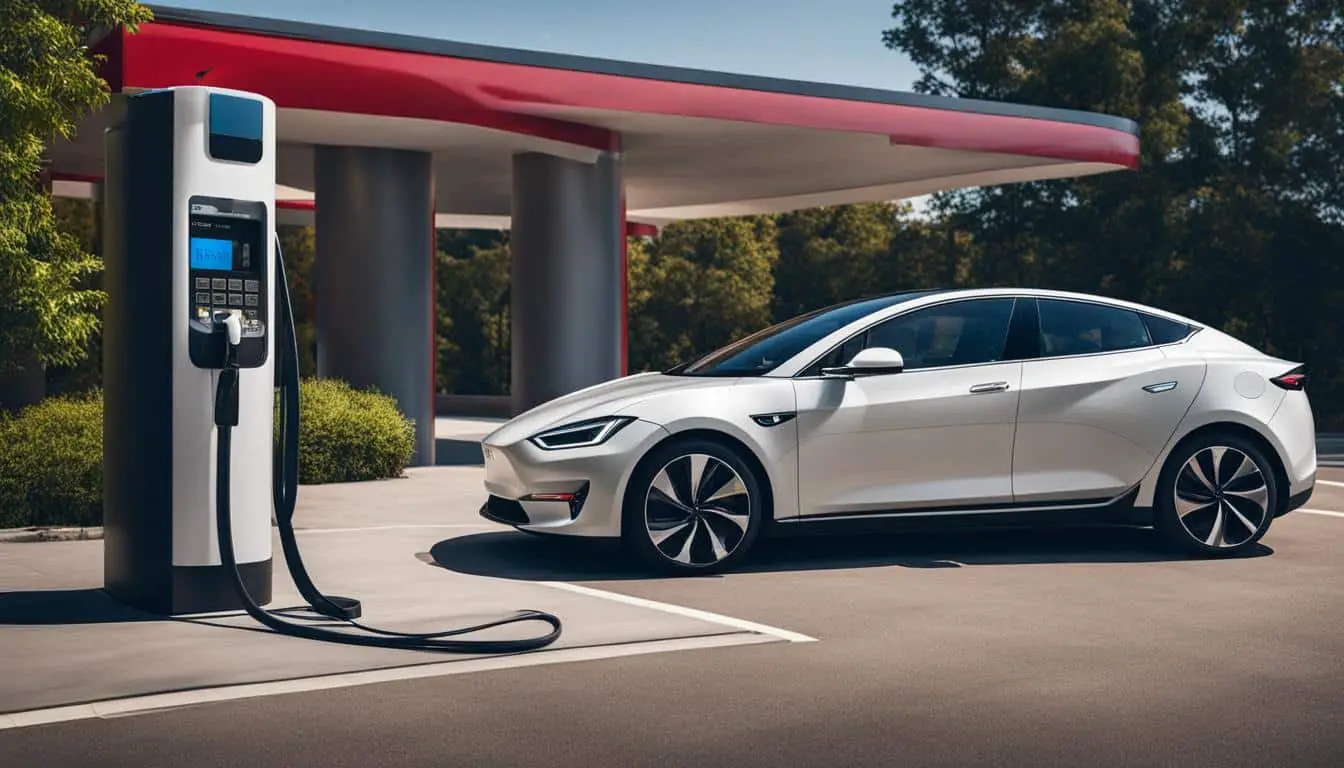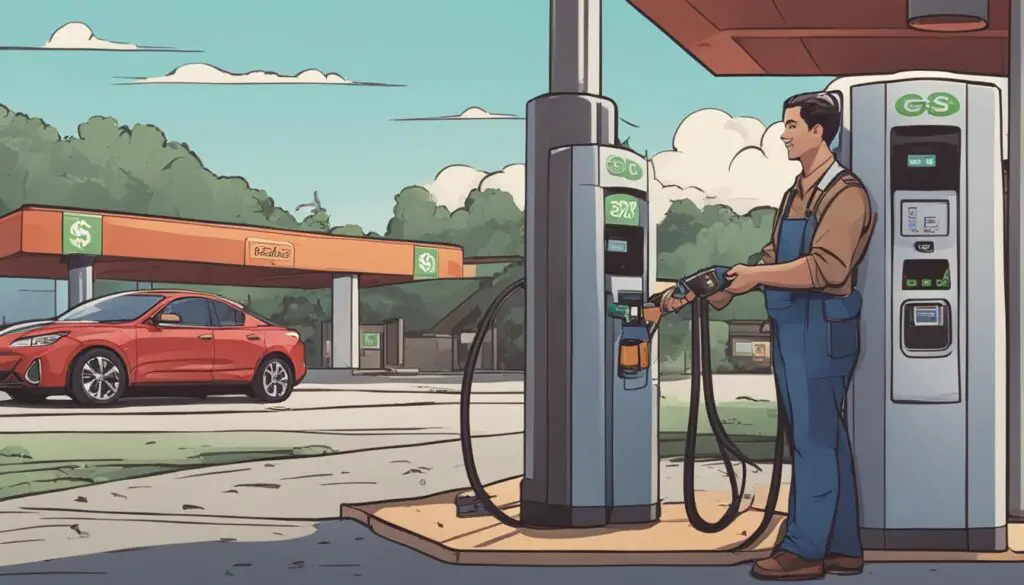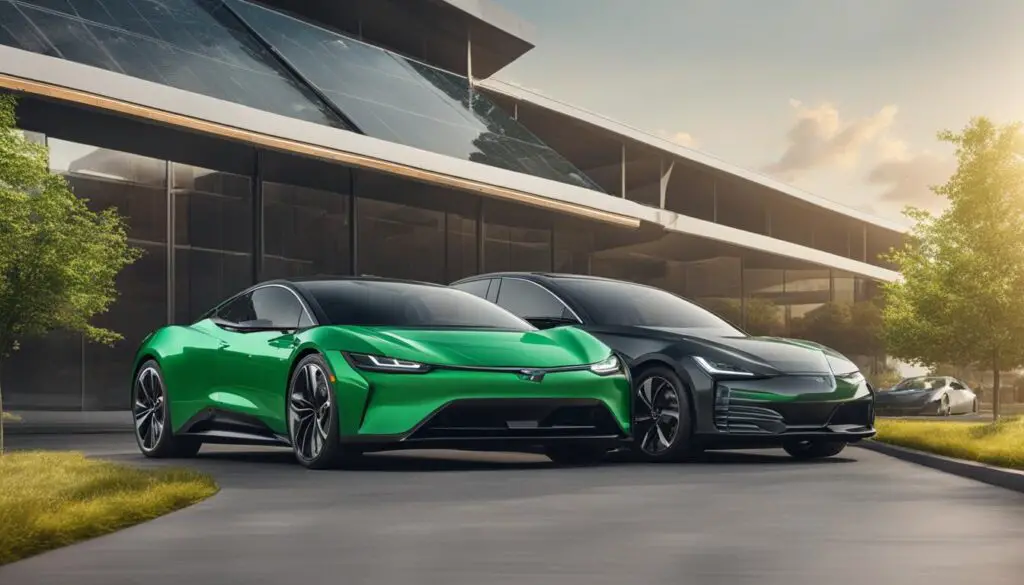
The Cost Benefits of Electric Vehicles Compared to Gasoline Cars
When it comes to choosing a vehicle, many factors come into play. From performance to reliability, there’s a lot to consider. One important factor that often gets overlooked is cost. And in today’s world, where being financially conscious is key, it’s essential to explore all cost-saving options. This brings us to the topic of electric vehicles (EVs) and their cost benefits compared to traditional gasoline cars.
Over the past year, the average price of a new EV has significantly decreased, making them more affordable than ever before. With brands like Tesla, Nissan, and Chevrolet leading the way, consumers now have a range of options to choose from. But the cost benefits don’t stop there.
Key Takeaways:
- EVs offer cost benefits compared to gasoline cars.
- The average price of new EVs has decreased, making them more affordable.
- Tax incentives, such as the federal EV tax credit, are available for EV buyers.
- Charging an EV at home is cost-effective with lower electricity costs compared to gasoline prices.
- EVs typically cost less to maintain and repair compared to gas-powered cars.
Sticker Prices and Tax Incentives for EVs
The average price paid for a new electric vehicle (EV) has significantly decreased, making them more affordable for consumers. According to Cox Automotive, in September 2023, the average price paid for a new EV was $2,800 more than the average paid for a new gas-powered vehicle.
Economical electric vehicle (EV) tax incentives are an additional benefit for consumers. EV tax incentives, such as the federal EV tax credit, provide financial relief when purchasing an EV. The federal EV tax credit offers up to $7,500 for new EVs, reducing the upfront cost. In addition to federal incentives, many states offer their own tax incentives for EV buyers, further reducing the financial burden.
Affordable EV options combined with tax incentives make it easier for consumers to transition to electric vehicles. These incentives can significantly reduce the initial cost of purchasing an EV and make them more financially feasible for a broader range of individuals.
| EV Sticker Prices | EV Tax Incentives |
|---|---|
| Decreased average price | Federal EV tax credit up to $7,500 |
| More affordable for consumers | State-specific tax incentives available |
By reducing the upfront cost and increasing affordability, EV sticker prices and tax incentives are instrumental in promoting the adoption of electric vehicles. These financial benefits not only make EVs more accessible to consumers but also contribute to a sustainable transportation future.
Cost of Electricity vs. Gasoline
When it comes to the cost of powering your vehicle, charging an electric car at home is generally more budget-friendly compared to fueling a gasoline car. A study conducted by the University of Michigan revealed that the average annual cost to fuel an electric car was $485, while gas-powered cars cost an average of $1,117. This significant difference in cost can lead to substantial savings over time for electric vehicle (EV) owners.
One of the key factors that contribute to the cost advantage of EVs is their fuel efficiency. According to the Department of Energy, current EVs are 2.6 to 4.8 times more efficient at traveling a mile compared to gasoline-powered cars. This means that EVs can cover more distance using less energy, resulting in lower electricity consumption and costs.
It is important to note that the cost of electricity versus gasoline can vary depending on the region and the prevailing electricity rates. Rates may differ significantly between states and even within local utilities. Therefore, it is advisable to consider the specific rates applicable to your location when estimating the charging costs of an EV.
Public charging stations offer convenience for EV owners who don’t have access to home charging facilities. However, it’s worth keeping in mind that public charging stations can be more expensive than charging at home. These stations may have varying pricing structures, including per-minute or per-kilowatt-hour rates, which can sometimes be higher than residential electricity rates.
| Type | Charging Method | Cost per Kilowatt-Hour (kWh) |
|---|---|---|
| Residential | Home Charging | $0.12 – $0.20 |
| Public | Charging Stations | $0.20 – $0.40 |
Table: Comparison of Residential and Public Charging Costs
As seen in the table above, residential charging typically costs between $0.12 and $0.20 per kilowatt-hour (kWh), while public charging stations may charge between $0.20 and $0.40 per kWh. These cost ranges further emphasize the potential cost savings when charging an EV at home.
Overall, the cost of electricity for EVs is generally more affordable than gasoline prices, and this cost advantage is amplified by the fuel efficiency of electric vehicles. When considering the lifetime costs of owning and operating an EV, the potential savings from lower charging costs make it a financially compelling choice for many consumers.
Maintenance costs for EVs
When it comes to maintenance, electric vehicles (EVs) have a significant advantage over gas-powered cars. The absence of spark plugs and oil changes in EVs contributes to lower maintenance costs compared to their gasoline counterparts.
One notable feature of EVs is regenerative braking, which helps reduce wear and tear on brake pads. This innovative technology converts the energy generated during braking into electricity, which is then used to recharge the vehicle’s battery. As a result, the traditional mechanical components of the braking system experience less stress and require fewer replacements, lowering maintenance costs in the long run.
While EVs require some basic maintenance, such as tire rotations and regular service checks, the overall cost of maintaining and repairing an EV is approximately half that of a gas-powered car. This can translate into substantial savings for EV owners over the vehicle’s lifetime.
The Cost Comparison of Maintenance
| Cost Item | EVs | Gas-Powered Cars |
|---|---|---|
| Tire Rotations | $50 – $100 per year | $50 – $100 per year |
| Regular Service Checks | $150 – $200 per year | $250 – $400 per year |
| Brake Maintenance | $0 – $100 per year | $100 – $300 per year |
| Total Annual Maintenance Costs | $200 – $400 | $400 – $800 |
As shown in the table above, the cost of annual maintenance for EVs ranges from $200 to $400, while gas-powered cars typically incur maintenance costs between $400 and $800 per year. The lower maintenance expenses associated with EVs can free up financial resources for other needs, making them an attractive option for cost-conscious individuals.
It’s important to note that these estimates may vary based on factors such as the make and model of the vehicle, local labor and parts costs, and driving habits. However, the overall trend of EVs having lower maintenance costs compared to gas-powered cars remains consistent.
Investing in an EV not only contributes to a cleaner and more sustainable future but also offers tangible financial benefits in terms of reduced maintenance costs. By opting for an EV, owners can enjoy a hassle-free driving experience while minimizing their long-term expenditure on maintenance and repairs.

Lifetime costs of EVs
When considering the lifetime costs of an electric vehicle (EV), it’s crucial to examine the various factors that contribute to the overall expenses. While EVs often have higher upfront costs compared to their gas-powered counterparts, the long-term financial advantages become evident when analyzing the cost comparison between EVs and gas cars.
One of the main cost-saving factors of EVs is the significant reduction in fuel expenses. Unlike gas cars that rely on costly gasoline, EVs run on electricity, which is generally cheaper. By charging an EV at home, owners can take advantage of lower electricity rates and reduce their lifetime cost of ownership.
Furthermore, the availability of tax incentives for EV buyers can further offset the initial expense of purchasing an EV. In the United States, the federal EV tax credit offers up to $7,500 in tax credits for qualifying electric vehicles. Additionally, many states provide their own tax incentives, making EVs more financially appealing to potential buyers.
“The lifetime costs of owning and operating an EV are often lower than those of a gasoline car, making EVs a more cost-efficient option.”
In terms of maintenance expenses, EVs generally prove to be more economical. With fewer moving parts and no need for oil changes or spark plug replacements, EV owners can expect lower maintenance costs compared to gas car owners. Additionally, regenerative braking systems in EVs help extend the lifespan of brake pads, reducing the need for frequent replacements.
| Cost Factor | Electric Vehicles (EVs) | Gasoline Cars |
|---|---|---|
| Fuel Expenses | Lower due to lower electricity costs | Higher due to gasoline prices |
| Tax Incentives | Potential savings from federal and state tax incentives | No specific tax incentives |
| Maintenance Costs | Lower due to fewer moving parts and no need for oil changes | Higher due to oil changes and various mechanical components |
By comparing the total costs of owning an EV versus a gas car throughout their lifetimes, it becomes evident that EVs offer substantial cost benefits. Despite higher upfront costs, the combination of reduced fuel expenses, tax incentives, and lower maintenance costs make EVs a financially advantageous choice.

Aside from the cost benefits, EVs also contribute to a more sustainable future. By reducing reliance on fossil fuels and producing zero tailpipe emissions, EVs help improve air quality and reduce carbon emissions, making them an environmentally conscious choice.
Conclusion
Choosing an electric vehicle (EV) over a traditional gas car can offer significant cost benefits. EVs have become more affordable, with decreased average prices and attractive tax incentives. Charging an EV at home proves to be a cost-effective choice, as it incurs lower electricity costs compared to gasoline. Moreover, EVs boast lower maintenance expenses, resulting in long-term savings.
When comparing the lifetime costs of owning and operating an EV versus a gas car, EVs often emerge as the more financially advantageous option. Not only do EVs provide cost benefits, but they also offer environmental perks by reducing carbon emissions and improving air quality. These factors make EVs a compelling choice for cost-conscious consumers seeking financial advantages and sustainable transportation.
FAQ
Are electric vehicles (EVs) more affordable than gasoline cars?
Yes, EVs often offer cost benefits compared to traditional gasoline cars. The average price paid for a new EV has significantly decreased over the past year, making them more affordable. Additionally, there are various tax incentives available for EV buyers, such as the federal EV tax credit and state-specific incentives.
How much do electric vehicles cost compared to gasoline cars?
The average price paid for a new EV has significantly decreased, making them more affordable for consumers. In September 2023, the average price paid for a new EV was $2,800 more than the average paid for a new gas-powered vehicle.
What tax incentives are available for electric vehicle buyers?
There are various tax incentives available for EVs, including the federal EV tax credit, which offers up to $7,500 for new EVs. Some states also offer their own tax incentives for EV buyers. These incentives can significantly reduce the upfront cost of purchasing an EV and make them more financially feasible for consumers.
Is charging an electric vehicle at home cost-effective?
Yes, charging an EV at home is generally cheaper compared to fueling a gasoline car. A study by the University of Michigan found that the average annual cost to fuel an electric car was $485, while gas-powered cars cost an average of $1,117. EVs tend to be more fuel-efficient, with the Department of Energy reporting that current EVs are 2.6 to 4.8 times more efficient at traveling a mile compared to a gasoline car.
How do electric vehicle maintenance costs compare to gas-powered cars?
EVs generally require less maintenance compared to gas-powered cars. Without spark plugs or oil changes, the maintenance costs for EVs are typically lower. Electric vehicles also have regenerative braking, which reduces the wear and tear on brake pads. While some basic maintenance, such as tire rotations and regular service checks, are still necessary, EVs cost about half as much to maintain and repair compared to gas-powered cars.
Are electric vehicles more cost-efficient in the long run?
When calculating the lifetime costs of an EV, it’s essential to consider factors such as upfront costs, charging costs, and maintenance expenses. While EVs may have higher upfront costs compared to gas cars, the overall lifetime costs are often lower. This is due to cost savings in fuel expenses, tax incentives, and lower maintenance costs. By comparing the total costs of owning and operating an EV versus a gas car, consumers can determine the cost benefits of choosing an EV.
